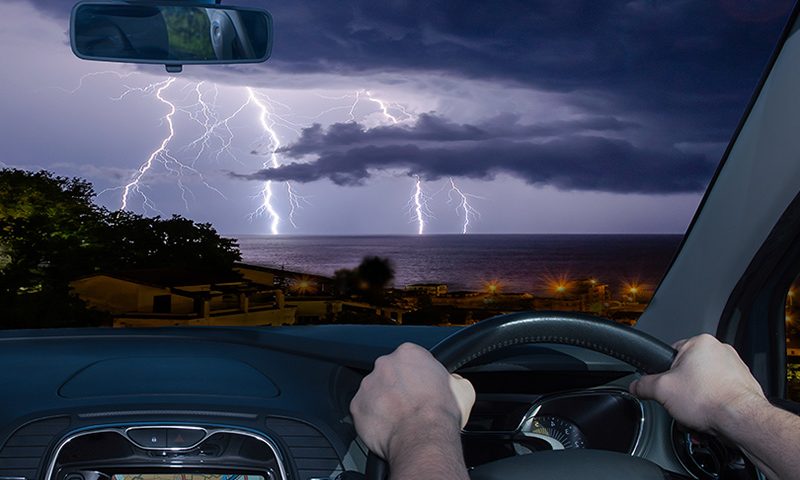Top tips for driving in a thunderstorm

It would seem that us Brits can never truly enjoy a few consecutive days of summer-like weather without the odd thunderstorm popping up to ruin our fun.
While thunderstorms can create some pretty epic scenes, they really are quite dangerous and should never be underestimated.
It’s thought that a lightning strike hits somewhere on the earth’s surface approximately 44 times every second, which equates to nearly 1.4 billion lightning strikes every year.
In the UK our lightning-related fatality rates are pretty low, with TORRO stating that around 30-60 Britons are struck by lightning each year, with an average of three deaths per year – so your odds are pretty good!
We’ve put together a little guide to driving in thunderstorms so you can rest assured that you know what to do once the thunder and lightning starts rolling in.
Driving in a thunderstorm

Driving conditions in a thunderstorm aren’t the nicest to be driving in, so just take it nice and easy.
We’d recommend that you drive at least 10mph below the speed limit as this will help you keep control of your car and maintain traction on the road if there’s rain.
You should also be aware that the time you need to brake will be doubled, so make sure you leave plenty of space from the car in front of you.
Visibility during thunderstorms can be limited and being seen by fellow road users is crucial, so turn on your headlights so other cars can see you.
Seek shelter where you can
If the storm is really bad, limiting your visibility and the road conditions are becoming dangerous, pull over and find shelter.
If there’s no shelter around then stay in your car, turn off your engine and turn on your hazard lights while you wait out the storm.
Don’t touch anything metal inside of your car. This includes the radio, cell phone chargers, mobile GPS devices, door handles, and the steering wheel. Staying away from metal objects can help keep you safe if lightning strikes your car.
If you’re on a bike or a scooter, don’t seek shelter underneath trees. While trees may provide cover from the rain, this will greatly increase your risk of being struck by lightning.
What to do if your car is struck by lightning?
Surprisingly your car’s metal body is what keeps you safe during a thunderstorm. Odd right? So as long as you’re not directly touching any part of the metal frame, you’ll be good.
Open and soft-topped vehicles (e.g. Jeeps and convertibles) don’t provide as much protection.
So, if there’s a storm on its way and you have the option of a second car that has a full metal frame, we’d suggest opting for that one.
If your car is unlucky enough to be struck by lightning, don’t worry, just wait until the storm has passed before getting out your car.
The current will flow through the metal body of your car to the ground, without having an impact on you, other than shaking you up a bit from the experience.
Before attempting to drive off, do a quick check of your tyres and vehicle for damage as tyre damage and electrical system malfunctions are common after a lightning strike.
What to do if you’ve had an accident?
Whilst your chances of being struck by lightning are pretty slim, having an accident due to bad weather conditions is much more common.
If you’re unlucky enough to be in this situation it’s important to stay calm.
Stop your car and, if possible, move it so that it’s in a safe position. Call 999 and call us, your insurer on 0333 043 2011, to let us know what’s happened so we can help you out.
If you want a more detailed step by step guide, just follow this link and it’ll outline everything you need to do if you’re ever in this unfortunate situation.
So, there you have it, our top tips for driving in a thunderstorm. For more information on the latest motoring news and views, check out the 1ST Central hub for everything you need to know to stay safe and knowledgeable on the roads.


